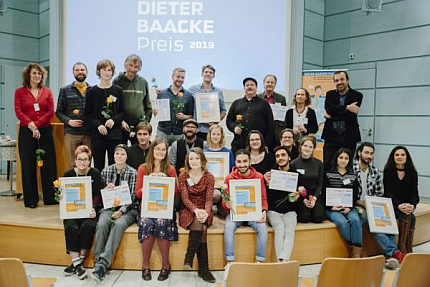Dieter Baacke Award Winner 2019 - Outstanding Media Education
How does it actually feel to be active as an influencer yourself? What skills does it involve? What happens when the school makes it compulsory for all students to wear a smartwatch? What happens when communication and control, scoring and ranking become an unavoidable part of everyday school life? Outstanding media projects actively involve children and young people not only to expand their technical digital knowledge, but also to deal creatively and critically with the effects and implications of media possibilities. This is particularly true of the award-winning projects How2Influence and Future Influencer - The smart school.
The young environmental editorial team of the Wuppertal media project uses social media formats in an ironic style to campaign for climate and environmental protection - alongside classic reportage. The Haste Töne project from Hamburg gives elementary school-aged children in a large citywide network the opportunity to tell stories they have developed themselves and to implement topics that concern them as videos or audio podcasts. The video competition Klappe gegen Rassismus! from Mecklenburg-Western Pomerania was honored as a particularly successful media education network.
Other formats address special groups: For example, the project Yalla - Rein in die Stadt! invites new immigrants to explore their new environment and share their recommendations for leisure and everyday activities as a video podcast. I can disappear in my art encourages the young visitors of an international girls' center to photographically stage themselves beyond conventional selfie aesthetics.
Gigantic and original is Adamstown - the film. In this large-scale media education project in a rural region, people of all ages and from a wide range of backgrounds are actively and creatively involved in front of and behind the camera. Film students from Rwanda also work as experts to ensure a particularly successful look for the film, which also addresses the issue of discrimination in terms of content.
The Society for Media Education and Communication Culture (GMK) and the Federal Ministry for Family Affairs, Senior Citizens, Women and Youth have been jointly presenting the nationwide award for outstanding media education work since 2001.
The Dieter Baacke Prize shows examples and methods of how up-to-date, versatile, visionary or even well-connected media education can be today. And how media education should soon look everywhere. Outstanding media projects with children and young people are the focus of the €12,000 prize.
The Dieter Baacke Prize is awarded in six different categories. Eight projects were honored this year. This and further information can be found on the website www.dieter-baacke-preis.de.

